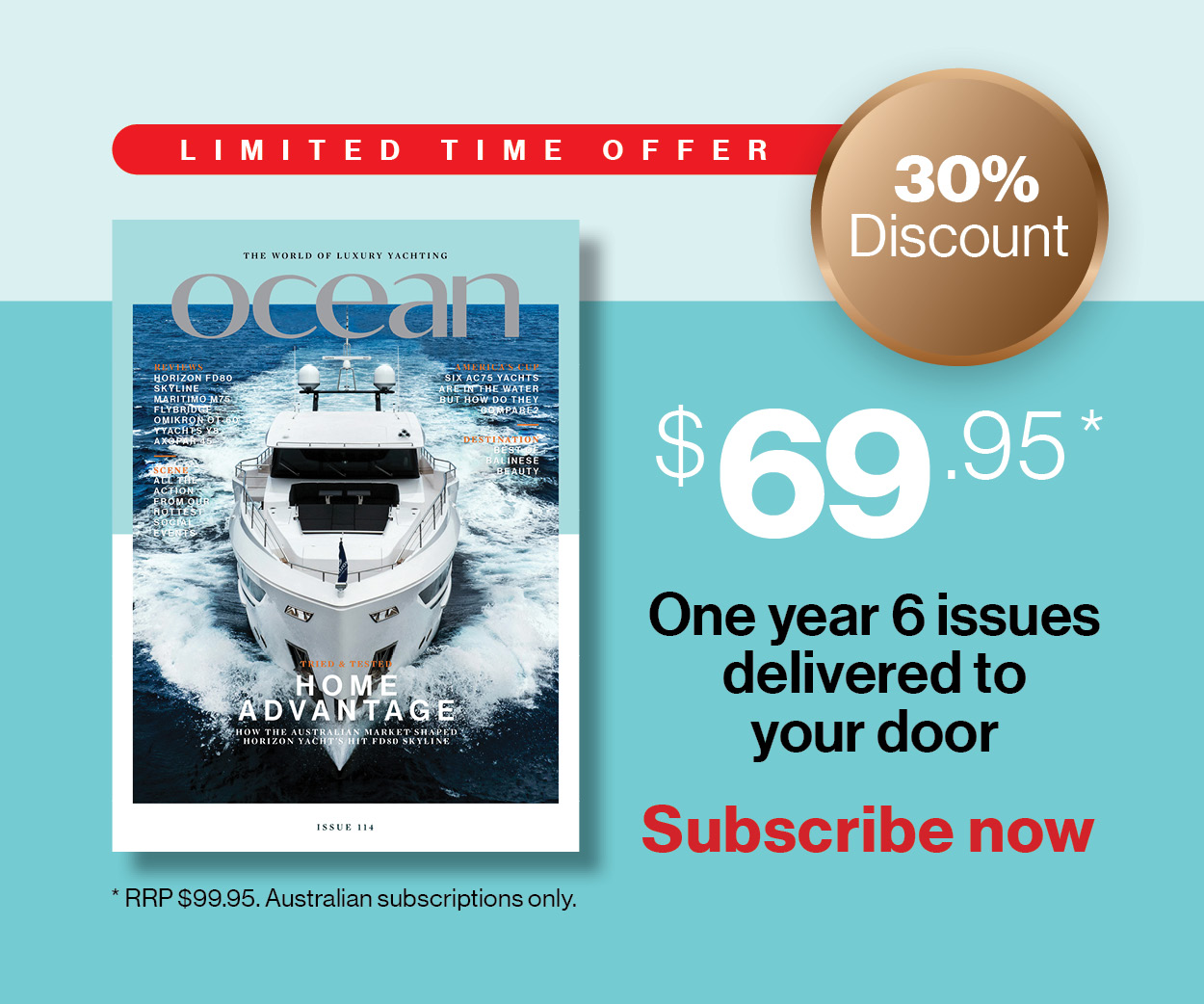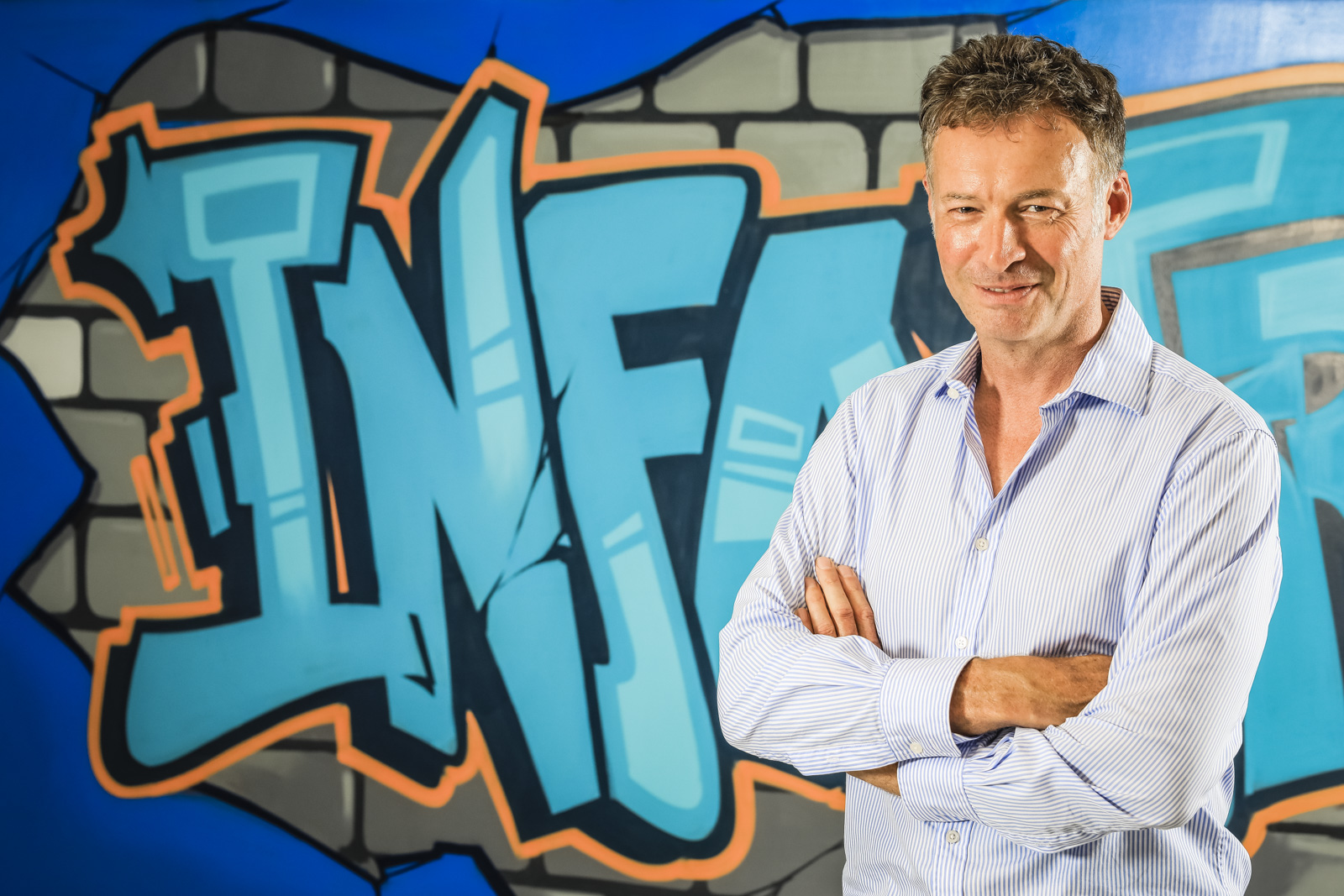The Start-up Sailor
Christian Beck was a disrupter well before the term was even coined. Beck sat down with Scott Alle and recounted how he did it, making sure he always had a boat to balance the grind.
Written by Scott Alle
Photography by Salty Dingo
08 May 2018
In the now highly evolved world of start-ups, “bootstrappers” occupy a special place.
They are variously described as “misfits” and “rebels”. They are the odd-shaped pegs who chafe at trying to be jammed into a round hole, who often possess that rare vision to entirely change the way something is viewed. They launch their businesses using only existing resources and are totally self-made.
There are bootstrapping legends in tech hubs around the world, like Silicon Valley, India, Japan. But in Australia there is Christian Beck, a disarmingly candid, low-key guy who started out writing legal software 20 years ago and is now one of the country’s most successful tech entrepreneurs.
His two main businesses – LEAP, a market-leading cloud-based legal software program, and InfoTrack, a one-stop legal search engine – have propelled him onto Australia’s rich list, with an estimated personal worth of over AU$600 million. The Sydney native shows a refreshing distaste for talking of such things when we meet, however. He is much more interested in sharing his plans for former Rolex Sydney Hobart line honours winner InfoTrack, which he now owns.
In fact, the softly spoken computer programmer also occupies a special category in the world of offshore sailing, a sphere of interest which attracts more than its fair share of non-conformists.
Nobody else has done their first Rolex Sydney Hobart, their first proper ocean race, on board their very own 100-foot supermaxi. And done it inside the record time set by that very same boat a year before. But Christian Beck has done both, riding InfoTrack (formerly Perpetual Loyal) into fourth place across the line in the 2017 instalment of the famous bluewater yachting event.
Asked at a pre-race news conference what his job would be on the immensely powerful machine, capable of surfing at more than 30 knots in the right conditions, he happily confessed to being a “glorified passenger”. Beck then joked that “supermaxi racing is the only sport where you can compete at the highest level without knowing what you are doing”.
Many among the assembled yachting and sporting press really did not know what to make of that non-filtered analysis, supermaxi owners usually being extremely wealthy individuals who would not necessarily be among the world’s top-ranked sailors. A point not normally acknowledged so publicly.
The no-frills take is typical of Beck, who in his self-deprecating way seems to revel in taking on challenges, including campaigning one of the fastest maxis on the planet. He did admit to “steering a lot” on the delivery trip from Hobart back to Sydney, and regularly skippers his smaller yacht on Wednesday twilight races on Sydney Harbour, so is not as clueless as he makes out.
Back in 1997, it was that obstinacy that saw a 20-year-old with virtually no computer management experience assume responsibility for running the software for his father’s legal practice.
“My dad set up a system just to run the IT side of his own business,” Beck recounts. “He gave me a job to look after it. I rewrote the software and we created a business to sell it to other lawyers, which we called LEAP; he always thought lawyers were too difficult to make any money out of.”
That was back in the days of the infant internet, and the young Beck became salesman, installer, trainer and programmer.
To keep costs down – something for which he is renowned, leading to the nickname “Crowbar” – Beck rented a unit in Drummoyne, close to the water in Sydney’s Inner West. His only indulgence, a share in a small Bluebird yacht, referred to by his friends as the SS Sh*tbox.
He persevered, if nothing else to prove a point his dad, David, whom he likes to portray as a kind of a Dennis Denuto from The Castle, mainly due to a shared hostility towards photocopiers.
“I was determined to prove him wrong,” Beck recalls with a wry smile. “Everyone else tends to give up with lawyers but we didn’t and became very good at dealing with them. That took some time but it’s proved to be very effective.”
Despite lacking a degree in computer programming or even going to university, by the time 2000 rolled around Beck had created what would these days be called a legal tech start-up with enormous potential.
“With programming, it doesn’t really matter whether you go to university or not,” he reflects. “In some things – like law or accounting or medicine – you have to, but in technology I don’t think it makes a lot of difference because arguably you learn faster on the job.”
Beck worked 72 hours a week and tried to minimise distractions.
“My basic strategy was that you get six good hours a day as a programmer. And I thought that if I spent six hours a day, six days a week, I could beat the competition making the best software for the competition,” Beck explains.
And he did. LEAP worked because it was very different to its competitors. There were many legal accounting providers but only a couple of legal productivity providers, and LEAP became the best at integrating with accounting systems.
Y2K paranoia among lawyers saw LEAP notch up a breakthrough year in 2000. Revenue soared from AU$250,000 to AU$1.2 million, with a profit of AU$200,000. The staff, which now included Beck’s sister Holly and his dad, expanded from four to 16.
LEAP made the Australian Deloitte Technology Fast 50, which charts rising tech stars, in 2004, 2008 and 2009. In 2014 and 2015, LEAP expanded to the UK and US markets. In 2016, LEAP Legal Software generated AU$50 million in annual revenue, and it now has more than 300 employees worldwide.
But LEAP lacked an important element: a legal search capability. InfoTrack plugged the gap, offering a one-stop search engine for critical legal and other company-related information from a variety of sources including ASIC, credit agencies, the electoral roll and litigation searches. Combined, they are an essential tool for small-to-medium-sized law firms.
The two thriving technology companies earned AU$231 million in revenue in the last financial year to June 2017. But it is a very relaxed vibe in the King Street offices of their umbrella corporate parent, Australian Technology Innovators, in the heart of Sydney’s CBD.
There are Daytona 500 arcade games, ping pong tables, a barista on hand to make your favourite brew – all pretty hip – but the monitors also update the hourly sales figures.
“We like to create a fun place to be but we also like to make it perform really well,” Beck points out. “We have an employee share plan, so we try to make sure everyone gets to participate in the growth of the business.”
These days, there are 20 companies spanning a diverse spectrum of tech areas, from legal software to a cloud-based security camera system, SmokeWall.
“You could have one big company doing this stuff but often separate companies with separate areas of focus often perform better. Small teams doing a very focused job are heard to beat,” he explains. “I’m the main shareholder in all of them, though they are separate companies. We do that for risk management reasons. We also run separate companies in each country where we operate offshore.”
As business has grown, so have Beck’s boats. Along with the way there have been several 40-foot sailing yachts, which have culminated in the supermaxi, InfoTrack, which he confides has made the company’s T-shirts much cooler. A Sunseeker 75 is used mainly for corporate entertainment, especially guests from overseas. Last year a staff member was even married on the British-built luxury yacht (“great fun”, according to Beck). The element of fun is an important one, and sailing is increasingly prominent in his plans.
“About four years ago, a friend invited me out on his 20-footer to do a twilight out of the Greenwich Flying Squadron (in Sydney),” he relays. Beck enjoyed it so much, he outlaid for several production cruisers, which ended up being too slow for the purpose, so he and his brother Darren bought Dump Truck, a very well performed Ker 11.3. It was a learning curve but Beck stepped up and came away with a win as skipper in Darren’s absence.
“I was really, really happy with that,” he laughs. “It got to the point where I hoped he wouldn’t turn up so I could skipper. Then we bought another 11.3 so I could skipper one and my brother could skipper the other. It’s been good because sometimes we bring staff members out, too.”
He agrees there are team dynamics on the racecourse that translate back in the office: “We had some absolute stars on the boat (InfoTrack) but who hadn’t sailed as a team before, and most of them hadn’t sailed on that boat. That’s a lesson in business: if you pull in a lot of star people it doesn’t necessarily create a good company. Good companies form over a period of time with people who may not be stars but meld into a very strong team.”
In June this year, this unassuming home-grown tech star will travel to Monaco for the naming of the ultimate accolade in entrepreneurship, World Entrepreneur of the Year. It is recognition of an inspiring career but somehow, I think what Beck will really enjoy is the creative firmament and ideas it will engender.







